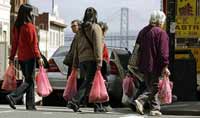China bans free plastic bags to change national shopping habits
China plans to ban free plastic bag in shops in a campaign to change people’s shopping habits and improve the environmental situation. The new measure will come into effect Sunday in China nationwide.

The Chinese currently use about 3 billion plastic bags a day. The bags are virtually indestructible taking years to break down and ending up in China’s clogged landfills, spokespeople for the China Plastics Processing Industry Association say.
Yu Chuanjing, a college student interning at an investment company in Beijing, said he didn't have the discipline to change his habits alone.
"Of course, there'll be trouble at the beginning, but it is a good policy in the long run," Yu said while buying onions at a grocery store. "It is everyone's duty to protect the environment."
Sun Peng, a project manager for a company that makes circuit boards for overseas clients, said at a fruit and vegetable roadside store that the measure is mainly for the Olympics and it would be important to see what happens afterward.
"It will be inconvenient, no question about it," he said. "But we advocated for a green games, didn't we? We can't have plastic bags everywhere."
In the U.S., grocers have encouraged consumers to recycle bags or bring their own, and a few states have enacted bans on free plastic bags.
A ban in Ireland cut the number of bags used by 90 percent, according to Waste Watch, a UK-based environmental non profit group. Several African nations have set thickness requirements that have effectively banned the flimsy thin bags that float in the air.
Under the rules, businesses nationwide will be prohibited from manufacturing, selling or using bags less than 0.025 millimeters (0.00098 inches) thick, according to the order issued by the State Council, China's Cabinet. More durable plastic bags will still be permitted for sale by markets and shops.
"Plastic bags undoubtedly are more convenient for consumers, but at the same time they also greatly endanger the environment," Commerce Ministry official Men Xiaowei said in a rare online question-and-answer session Thursday about the policy.
He said 3 percent to 5 percent of the weight of landfills is made up of plastic waste from households, the majority of which are plastic bags.
With oil prices up more than 42 percent since December, the rule is also an attempt to cut energy use. It takes 37 million barrels of crude oil a year to make all the bags needed for China.
Owners of local fruit stalls and supermarkets said the measure would not affect their business, as they mostly only plan to charge a couple of cents for plastic bags.
Paris-based supermarket Carrefour, China's biggest retailer, said it would charge 2 mao (2 US cents; 2 euro cents) to 1 yuan (14 US cents; 9 euro cents) for the plastic bags. It also sells cloth bags.
Subscribe to Pravda.Ru Telegram channel, Facebook, RSS!





